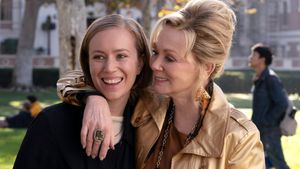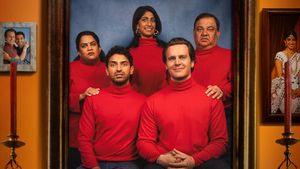A new era in HIV-related filmmaking is upon us, and it's all about the 1980s. Here or imminent are Dallas Buyers Club (about a real-life straight man who was diagnosed with AIDS in 1986 and started importing experimental drugs), The Normal Heart (the HBO adaptation of Larry Kramer's seminal play about the early days of AIDS activism), and Test (a hypnotic film set in the panic-drenched San Francisco of 1985). All three look back to an era when the hysteria surrounding AIDS was at its worst, since not nearly as much was known as today about the illness and what exactly to do about preventing or treating it. The resulting dramas deal in the terror and phobias that arose and the various ways to combat them, from ingenuity to rage to a vivid combination of the two.
This is one of the rare cultural moments when AIDS has become script fodder; filmmakers usually avoid it like the plague. When the '80s were actually happening, movies were slow to recognize the growing epidemic that wasn't exactly guaranteed to bring in paying customers, though a few brave artists did aim their lenses at the horror and the human glow that made it more bearable. Released in 1986, Parting Glances was a quirky and sincere film, with Steve Buscemi breathtaking as a sick but moxie-laden eccentric. In 1989, Longtime Companion heart-wrenchingly spanned a decade in AIDS as experienced by a circle of New York City friends. There were some future stars in the cast, but four years later, Jonathan Demme's Philadelphia attached superstar wattage to the story of a tasteful law associate (Tom Hanks) who is fired after developing AIDS and gets defended by a homophobic lawyer (Denzel Washington). Hanks's fuzzy character seemed more symbolic than real, but the film broke ground and hearts, while nabbing five Oscar nominations. The Academy loves rewarding straights playing gays--especially if they're sick or in some other way victimized -- so Hanks was a natural to cop the prize. Besides, he was brilliant.
Other AIDS films came in fits and starts through the years, with long periods of no representation at all, but after subplots in I Love You Phillip Morris and Precious, last year's How to Survive a Plague brought the subject back with fiery results that critics dubbed "electrifying" and "remarkable." David France's doc about the powerful impact of activist groups ACT UP and TAG--starting in the '80s--won bouquets and awards, though the public didn't exactly line up to see it. Plague raked in only $132,055 domestically, while the film that beat it for the Oscar, Searching for Sugar Man, made 25 times that. But Plague was optioned by ABC for a miniseries, and if that happens, it will make AIDS "cinema" big business indeed.
 At Left: Scott Marlowe and dancers in
At Left: Scott Marlowe and dancers in Test
TV might be the perfect venue for these films after all. For years, The Normal Heart was going to be produced and directed by Barbra Streisand as a feature film, but there were setbacks, including an ongoing battle between Streisand and Kramer over the focus of the script. Finally, Ryan Murphy (Glee, American Horror Story) was set to direct a movie version, but all of a sudden in January, it was announced as an HBO title instead. (Like Beyond the Candelabra -- which ends with Liberace's AIDS death--the big screen can't seem to handle something "too gay," while HBO certainly can. Candelabra was their biggest movie premiere, ratings-wise, since 2004.) With names like Mark Ruffalo and Julia Roberts heading this Heart, it's bound to get an audience, who'll learn about the devastating realities of AIDS's darkest days. The result is further proof that skipping the middleman -- Hollywood -- might be the most sensible way to go with projects like this, even if that doesn't always happen by choice.
But with a big name playing a hetero lead, the silver screen can still go for AIDS, as long as you're willing to wait over 20 years for it to happen. Dallas Buyers Club spent eons in limbo before making the leap to celluloid, ending a road paved with antsy film studios, fed-up-with-waiting stars, and equally frustrated writers. But Matthew McConaughey worked some manipulations and the film finally ended up getting off the ground, especially since he lost 30 pounds in an eye-grabbing show of commitment. He plays Ron Woodroof, a womanizing, heavy-drinking Texas electrician with AIDS who learns about the extreme toxicity of AZT and fights the big boys to cut through red tape and illegally get alternative medicines out there. How to survive a plague, indeed. Far from Philadelphia, this time it's the hater who's dying ("I ain't no f****t, motherfucker!" barks Woodroof at a doctor), though the actor generously plays Wood- roof's bigotry as bravado covering up the humanity lurking underneath--a caring side that fully emerges as he becomes an activist and fighter.
McConaughey engineered a career shakeup himself last year, dropping his romcom formulas for parts with grit and integrity, and this film -- a sobering look at a bold personal attempt to circumvent the corruption of organized medicine--takes it to a potent next level. He's great, and so is Jared Leto as his woozy transsexual friend with AIDS -- an endearing creature escaping a righteous dad while longing to stay alive. Maybe we needed 20 years before we could get an AIDS hero as complicated as Woodroof.
For a gay lead grappling with AIDS issues, you have to go back to the really small films, like Chris Mason Johnson's beautifully observed Test, in which a dancer in 1980s San Francisco faces the mounting panic that's making everyone uncomfortable with their bodies -- and everyone else's too. The film studs its plot with modern dance numbers, as well as backstage glimpses at dancers searching themselves for irregularities. It ends with a wry comment on whether gay monogamy will be the answer -- the kind of modern touch that makes today's period films about AIDS all the more haunting.
Next up for AIDS cinema: the 1990s?


 At Left: Scott Marlowe and dancers in Test
At Left: Scott Marlowe and dancers in Test















































































